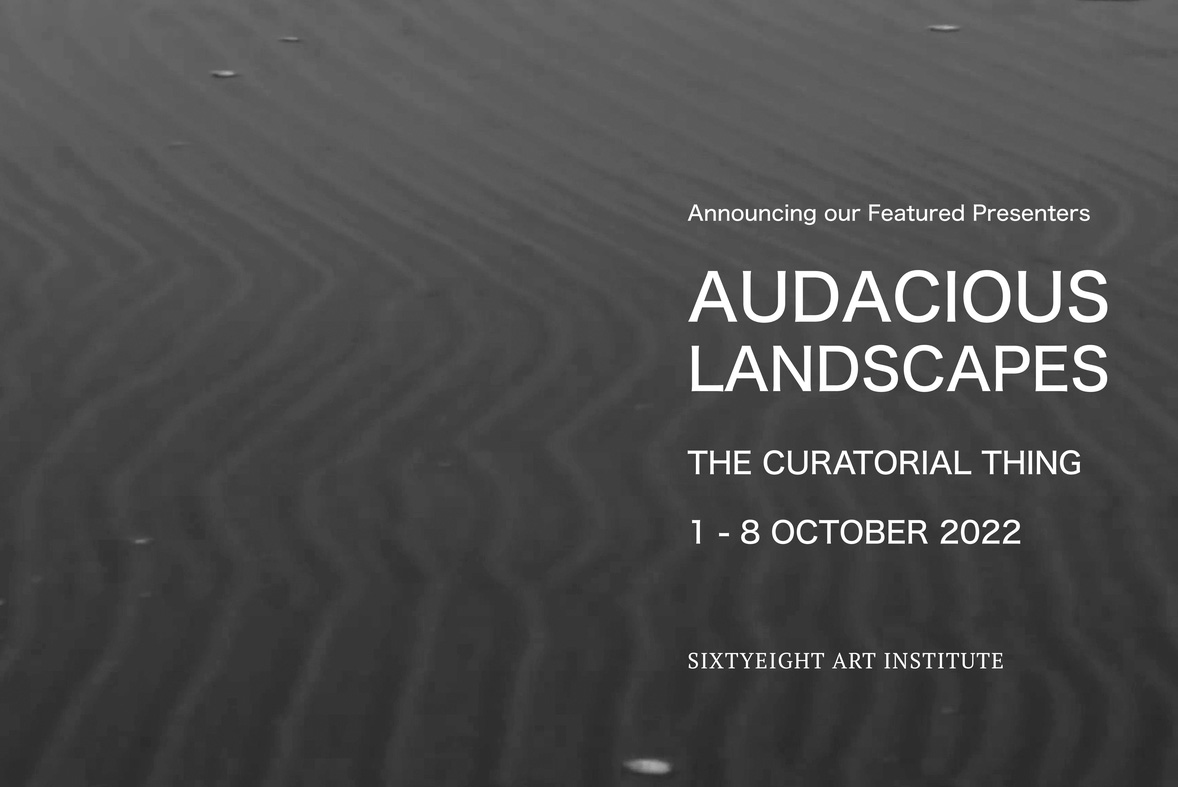The Curatorial Thing: Audacious Landscapes
1 - 8 October 2020

The Curatorial Thing 2022 explored research on climate art histories and critical discussions of future imaginaries in a warming world, as well as incorporating critical approaches to climate grief and regenerative thinking through art, architecture, and design.
The title Audacious Landscapes was chosen from a 1938 poem by Muriel Rukeyser on witnessing an industrial landscape with "clouds over every town" that "indicate the stored destruction," foreshadowing our own time. As this carbon buildup has led to global climate crises, curatorial practices have become a form of witness. In developing The Curatorial Thing, we read "audacious" as a paradox of capitalist hubris and the risk of imagining better possible afterlives. Using this paradox as a starting point, we consider "landscape" beyond framed artworks in museums, as art objects take on new roles in the public sphere.
The workshops and keynote lectures of this Thing not only focused on the aftermath of climate-related art histories, but also explored climate grief as a moving bio-physical space to seed new and active imaginations. To this end, we wanted to investigate how art can inspire larger-scale solutions for a warming world and, at the same time, find the historical lineages that can give us both the hermeneutic and contemporary tools to sustain critical spaces, such as those that can nurture and support these new imaginations.
The Thing was shaped by workshops among participants and invited speakers, site and studio visits, and lectures open to the general public.
Public Programme
Saturday, 1 October
Critical Visions in a Warming World
Anne Haaning, visual artist and Research Fellow, The Norwegian Artistic Research Programme
KEYNOTE: T.J. Demos, art historian and cultural critic, Professor in the Department of the History of Art and Visual Culture, University of California, Santa Cruz
Installation Opening
Anne Louise Blicher, Grief Shrine
Part of the Climate Thanatology project
In collaboration with Sharp Projects in Copenhagen. This installation invited visitors to inhabit a passageway through climate grief, opening thoughts on regeneration and is part of Climate Thanatology, a curatorial project represented within the overall framework of The Curatorial Thing.
Monday, 3 October
Further video documentation forthcoming...
Interactive Shadow Theatre
Part of the Climate Thanatology project
The Bird Ladies
HenBlakstad Productions in co-production with Animalske Productions
(NO), silo portem, sound art duo (UK), Catharine DeLong, harpist (US)
Tuesday, 4 October
Climate and Cultural Art Histories
Mathilde Helnæs, curator, Sorø Kunstmuseum
Luamba Muinga, curator, cultural researcher, writer
KEYNOTE: Andri Snær Magnason, writer and documentary filmmaker, author of On Time and Water
Wednesday, 5 October
Image and Media in Climate Communication
Catherine Sarah Young, artist, Manila/Sydney
Jørgen Bruhn, intermediality and ecocriticism specialist, Professor of Comparative Literature, Linnaeus University
KEYNOTE: Diedrich Diederichsen, writer and cultural critic, Professor of Theory, Practice, and Communication of Contemporary Art, Institute for Art History and Cultural Studies, Vienna
Friday, 7 October
Engaging with Place: Ruin, Memory, Regeneration
Maddie Leach, artist/Senior Lecturer in Fine Arts, University of Gothenburg
Ash Sanders, climate writer and activist
KEYNOTE: Darren Parry, former chairman of the Northwestern Band of the Shoshone Nation, author and founder, Boa Ogoi Cultural Interpretive Center
Saturday, 8 October
Regenerative Architectures in Climate Art History Perspective
Ariana Kalliga, independent curator, New York and Athens
Angela YT Chan, researcher, curator, and artist
KEYNOTE: Beatriz Colomina, architecture historian and theorist, Howard Crosby Butler Professor of the History of Architecture, Princeton University
The Fifth Edition of The Curatorial Thing was organised by Heidi Hart and Hugo Hopping for SixtyEight Art Institute and made possible with the generous support of the Novo Nordisk Foundation. Hosting partners in Copenhagen were LiteraturHaus, The Faculty Library of Social Sciences at University of Copenhagen, Statens Værksteder for Kunst, and Assistens Kirkegård.